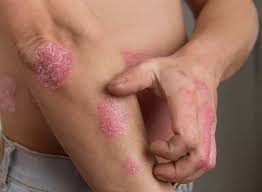Psoriasis is a chronic skin condition that affects millions of people worldwide, causing red, scaly patches on the skin. Although there is no known cure, effective psoriasis treatment options are available that can help manage symptoms and improve the quality of life. This blog explores the various methods for managing psoriasis and discusses how you can work towards achieving long-term relief.
Understanding Psoriasis
What is Psoriasis?
Psoriasis is an autoimmune disorder where the body's immune system mistakenly attacks healthy skin cells, leading to rapid skin cell turnover. This results in thick, scaly patches that can be itchy, painful, and sometimes even debilitating. Psoriasis can vary in severity from small, localized patches to widespread outbreaks.
Symptoms of Psoriasis
Common symptoms include:
- Red, raised patches of skin covered with silvery scales
- Dry, cracked skin that may bleed
- Itching, burning, or soreness
- Swollen or stiff joints (psoriatic arthritis)
Understanding these symptoms is crucial for diagnosing and managing the condition effectively.
Conventional Psoriasis Treatment Options
Topical Treatments
Topical treatments are often the first line of defense for managing psoriasis. These treatments are applied directly to the skin and include:
- Corticosteroids: Reduce inflammation and slow down skin cell turnover.
- Vitamin D Analogues: Help to slow down skin cell growth and reduce scaling.
- Coal Tar: Reduces scaling, itching, and inflammation.
Phototherapy
Phototherapy involves exposing the skin to ultraviolet (UV) light under medical supervision. It helps to slow down the rapid skin cell growth associated with psoriasis. There are two main types:
- UVB Phototherapy: Uses UVB light to treat the affected areas.
- PUVA Therapy: Combines UV light with a medication called psoralen to make the skin more sensitive to light.
Systemic Medications
For moderate to severe psoriasis, systemic medications may be prescribed. These work throughout the body and include:
- Oral Medications: Such as methotrexate, cyclosporine, and acitretin.
- Biologics: These are injectable medications that target specific parts of the immune system to reduce inflammation.
Natural and Alternative Psoriasis Treatment Methods
Dietary Changes
Certain dietary changes may help manage psoriasis symptoms. Consider incorporating:
- Anti-Inflammatory Foods: Such as fatty fish, nuts, and leafy greens.
- Elimination Diets: Removing potential triggers like gluten, dairy, or nightshades may benefit some individuals.
Herbal Remedies
Herbal remedies can be used as complementary treatments. Popular options include:
- Aloe Vera: Known for its soothing properties and ability to reduce inflammation.
- Turmeric: Contains curcumin, which has anti-inflammatory effects.
Stress Management
Stress is a known trigger for psoriasis flare-ups. Techniques to manage stress include:
- Mindfulness and Meditation: Can help reduce stress levels and improve overall well-being.
- Regular Exercise: Engaging in physical activity can improve mood and reduce stress.
Lifestyle Adjustments for Managing Psoriasis
Maintaining a Healthy Weight
Being overweight can exacerbate psoriasis symptoms. Maintaining a healthy weight through balanced diet and exercise can help manage and potentially reduce the severity of the condition.
Avoiding Triggers
Identifying and avoiding triggers is essential for managing psoriasis. Common triggers include:
- Skin Injuries: Scratches, cuts, or sunburns.
- Infections: Such as strep throat.
- Certain Medications: Some drugs may worsen psoriasis symptoms.
Skincare Routine
A consistent skincare routine can help manage psoriasis. Tips include:
- Moisturizing Regularly: Helps keep the skin hydrated and reduces scaling.
- Using Gentle, Fragrance-Free Products: Reduces irritation and avoids worsening symptoms.
Advanced Psoriasis Treatment Options
Biological Therapy
Biological therapy is a newer class of treatment that targets specific parts of the immune system. These treatments are administered via injection or intravenous infusion and can be highly effective for severe cases of psoriasis.
Clinical Trials
Participating in clinical trials can provide access to new and experimental treatments. Clinical trials offer opportunities to try cutting-edge therapies that may not yet be widely available.
Combination Therapies
In some cases, combining different psoriasis treatment options may provide better results. For example, using topical treatments along with phototherapy or systemic medications can enhance overall effectiveness.
Monitoring and Managing Psoriasis
Regular Follow-Ups
Regular follow-ups with a healthcare provider are crucial for monitoring the effectiveness of treatments and making necessary adjustments. This helps ensure that the treatment plan remains effective and that any side effects are managed appropriately.
Tracking Symptoms
Keeping a diary of psoriasis symptoms, triggers, and treatment responses can provide valuable insights. This information can help tailor treatments to better suit individual needs.
Conclusion
While there is no permanent cure for psoriasis, various psoriasis treatment options can help manage and alleviate symptoms effectively. From conventional treatments like topical applications and phototherapy to natural remedies and advanced therapies, finding the right approach involves a combination of methods tailored to individual needs. By understanding your condition, exploring different treatment options, and making lifestyle adjustments, you can work towards achieving long-term relief and improving your quality of life.





Comments